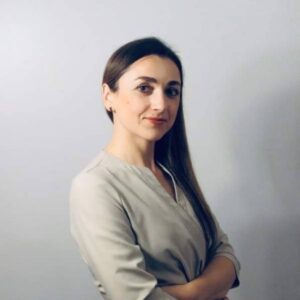
An Update on the War in Ukraine: What’s at Stake for the U.S.
As Russia’s brutal war against Ukraine nears the two-year mark, fears mount that there will be a disruption in crucial US aid to Ukraine. While Ukrainians continue to endure Russian bombardments, Russia’s determination to keep fighting is based on expectations of reduced Western support to continue the war effort. In her talk, Olena Lennon will take stock of the current battlefield dynamics, discuss future paths forward, and what’s at stake for the US.
Olena Lennon, Ph.D. is an Adjunct Professor of National Security at the University of New Haven, where she teaches such courses as the U.S. Foreign & Defense Policy and International Relations. Formerly a Fulbright scholar from Ukraine, and most recently a scholar at Woodrow Wilson Center in Washington, D.C., she has dedicated her research to the study of conflict management and identity politics in eastern Europe, focused on domestic and foreign policy of Ukraine. An eastern Ukraine native, Dr. Lennon has been a regular participant in scholarly and media forums related to issues in Ukraine, facilitating a more informed and objective analysis of the ongoing Russo-Ukrainian war. She also serves as an election observer with the Organization for Security and Cooperation in Europe (OSCE) and has completed several election observation missions in the region. Her work appeared in Foreign Affairs, The National Interest, Demokratizatsiya, Eurasian Geography and Economics, and other outlets.
Speaker suggested by Jan Selkowitz
Speaker Summary
Dr. Lennon provided an in-depth, insightful, and often discouraging talk on the state of the War in Ukraine, the costs of the war, the dangers if Ukraine doesn’t emerge victorious and the likelihood of significant progress in the near-term based on her extensive knowledge of the region, the cultural and political realities of the countries involved, and what’s at stake for both sides. In the process, she lent valuable insights into misperceptions about how Russians likely view the war, why Ukrainians see no option other than continuing to fight, and why anything short of a Ukrainian victory creates risks to the US and the West. Her views were framed by her experience studying wars and foreign relations in the area as well as having lived in (and having on-going connections to) the southeastern region of Ukraine.
Olena began with an up-to-the-minute report on recent activities in Ukraine (literally from the night before her talk) and laid out the premise that there will be no military solution to the war but that there is currently no viable political solution, so the military battle will continue. And she doesn’t expect an end to the war anytime soon due to the intransigence on both sides.
She shared “statistics” from the war: casualties, displaced populations, infrastructure destruction, impact on the Ukrainian economy, global food supply impact, and, especially, the “genocidal” impact of the Russians “repatriating” 6000 Ukrainian children to Russia. This served as evidence of the Russian “way of war” and why it makes it impossible for Ukrainians to do anything but commit to fight for as long as necessary to survive.
Olena spoke to how recent Russian escalations reflect the damage inflected by the Ukrainians, retaliation for Russian Navy humiliations, and Putin’s need to push harder to deliver on his promise to “liberate” Ukraine in advance of his upcoming election. She noted a stalemate in terms of territorial progress of the war, but rejected the notion there’s a true stalemate because both sides continue to believe they can win, and that defeat is unacceptable, so they will fight on. As a result, her prognosis for the near term seemed discouraging and pessimistic as the fight drags on. And, while talking to Ukraine’s strategic gains, including a more consolidated identity and unity as a democratic nation, she made it clear that much of the motivation to continue fighting was about survival and avoiding future generations from fighting the same war as much as about fighting for democratic ideals.
Dr. Lennon also made it clear that hopes/expectations that Russians would rise up to overthrow Putin and the Russian government were inconsistent with the Russian cultural, political and military system. In fact, the long-term view of Russians is about maintaining and protecting their sovereignty and that they view the fight to regain their territory to be justified. Additionally, they also know that engaging in political insurgency is a formula for certain personal disaster, and the benefits of war (for those fighting and their survivors should they die), is great. So, the Russian people will not likely be the source of instability and threat to Putin and, in fact, she thinks the war would likely outlive Putin if he were to no longer be in power.
Olena closed with a discussion of risks to the US if Ukraine loses ranging from lost deterrence credibility to further challenges from hostile governments to the cost of needing to support insurgent warfare since Ukrainians will continue to fight regardless of any “formal” agreement that reflects Russian victory. In this context, she emphasized that the “deal” the US and West have had so far has been pretty good with no loss of life and largely providing resources from old stockpiles. The key to a better 2024 and future for the war is the willingness of the US to continue to invest and support these efforts. But she worries that foreign policy and wars have historically been used for political agendas, especially in election years.
A detailed and lively Q&A session that enabled Dr. Lennon to expand upon and reinforce many of her points and perspectives followed.
